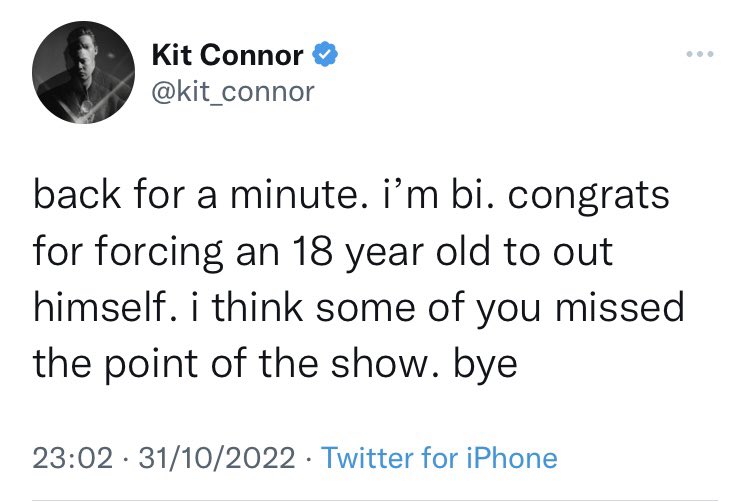Graphic by Christopher Ikonomou (Xe/He)
This article was updated for spelling errors on Dec. 25 at 9:10pm PT.
On Oct. 31, 2022, Kit Connor, one of the stars of Netflix’s “Heartstopper,” took to Twitter to announce his bisexuality. He wrote, “back for a minute. i’m bi. congrats for forcing an 18 year old to out himself. i think some of you missed the point of the show. bye.” Fans of the show were quick to reply with messages of support. Many of the replies empathized with him, as viewers were upset that he was forced to relinquish parts of his private life after facing accusations of “queerbaiting” when he was spotted with a girl around his age.
For many bisexuals, such as myself, this is not a new phenomenon. While there have been strides in the queer community to be more accepting of bisexuality, there is still pressure to fall into the binary of straight or gay. Kit Connor is not an exception, and neither are multiple other celebrities that have been accused of “queerbaiting” because they are with someone of the opposite sex and haven’t been explicit about their queerness. Bisexual people, or anyone who isn’t monosexual, shoulder a burden of having to constantly prove that they are queer.
There seems to be this odd sense of entitlement to knowing our sexuality, and having those personal conversations is exhausting. They alienate us from the community, and, further, they make us feel uncomfortable with being bisexual. We are tired of being under constant surveillance. The queer community has become a panopticon within itself, morally judging relationships on their proximity to homosexuality or heterosexuality. However, none of these categories are cut and dry. Romantic and sexual attraction, for most if not all bisexuals, are fluid. And even if they aren’t, no one should be an arbiter on how bisexual people present themselves, and their queerness should not be evaluated based on who they are currently dating.
There has always been a feeling that someone is watching us, calculating our every move and the minute we “step out of line” (in the sense that our lives don’t neatly fall into the apparently universal queer experience), we’re deemed as outsiders. Our queerness, rather than being something intrinsic, is now entirely dependent on how the world sees us. The myth of the perfect bisexual still supersedes the reality that they don’t exist. The perfect bisexual, the idea that our attraction is somehow morally connected to who we are, is an idea that harms us. We’re constantly asked to perform queerness (whatever that means), instead of people believing that we are already queer.
For bisexual femmes, this means that we are asking for attention when we claim bisexuality. For bisexual mascs, secretly they are only gay but in denial of who they are. The perfect bisexual seemingly does not encapsulate these outdated notions of bisexuality, as it still perpetuates the expectation that bisexuals must date a person of their same gender, or else they aren’t truly bisexual. This causes further issues for those of us in the nonbinary camp. The perfect bisexual is someone who is non-sexual, someone who falls in line with what everyone else tells them, someone who doesn’t cause us to rethink our notions of queerness and sexuality. It is someone like Kit Connor, whose romantic relationship on the screen was seemingly fetishized to the point that fans of “Heartstopper” felt personally hurt when he developed a relationship with someone of the opposite gender.
Our relationships are always watched, always analyzed to see if we are telling the truth. Why is it the assumption that we are always lying about our sexuality? Or that we are taking advantage of our labels and not truly part of the queer community? It begs the question of who is deserving of community, and who has that power to assert that.
Bisexual people are not the only ones with this problem. People on the ace/aro spectrum, nonbinary people, and so many other identities that transcend binaries always toe a delicate social line. Even binary trans folks, such as the tragic Isabel Fall, have been accused of “not being actually queer” because of how they view and discuss their position in the world. We as a society spend so much of our time assigning weight to labels that we do not stop to think about how dangerous they can be and how they can create an unsafe environment for queer folks to exist in.
We, as a community, need to do better in the way we approach sexualities outside of the traditional L & G. Watching Kit Connor have to defend his bisexuality is especially angering because I truly believed we were past the nonsense of whether or not someone can be truly bisexual. We should work on making our spaces more open for those that need it, instead of ostracizing people, especially bisexuals, because of their own personal relationships (which is none of our business in the first place!).
Credits:
Author: Judah C (They/Them)
Artist: Christopher Ikonomou (Xe/He)
Copy Editors: Zora Lam (She/Her), Bella (She/They)


With all due respect Kit Connor’s name and spelling of name are
right there in the picture you used for your article. It proves very
distracting from what you’re trying to say when you spell the man’s
name as you did. The man won an Emmy award this month please
make an effort in future.